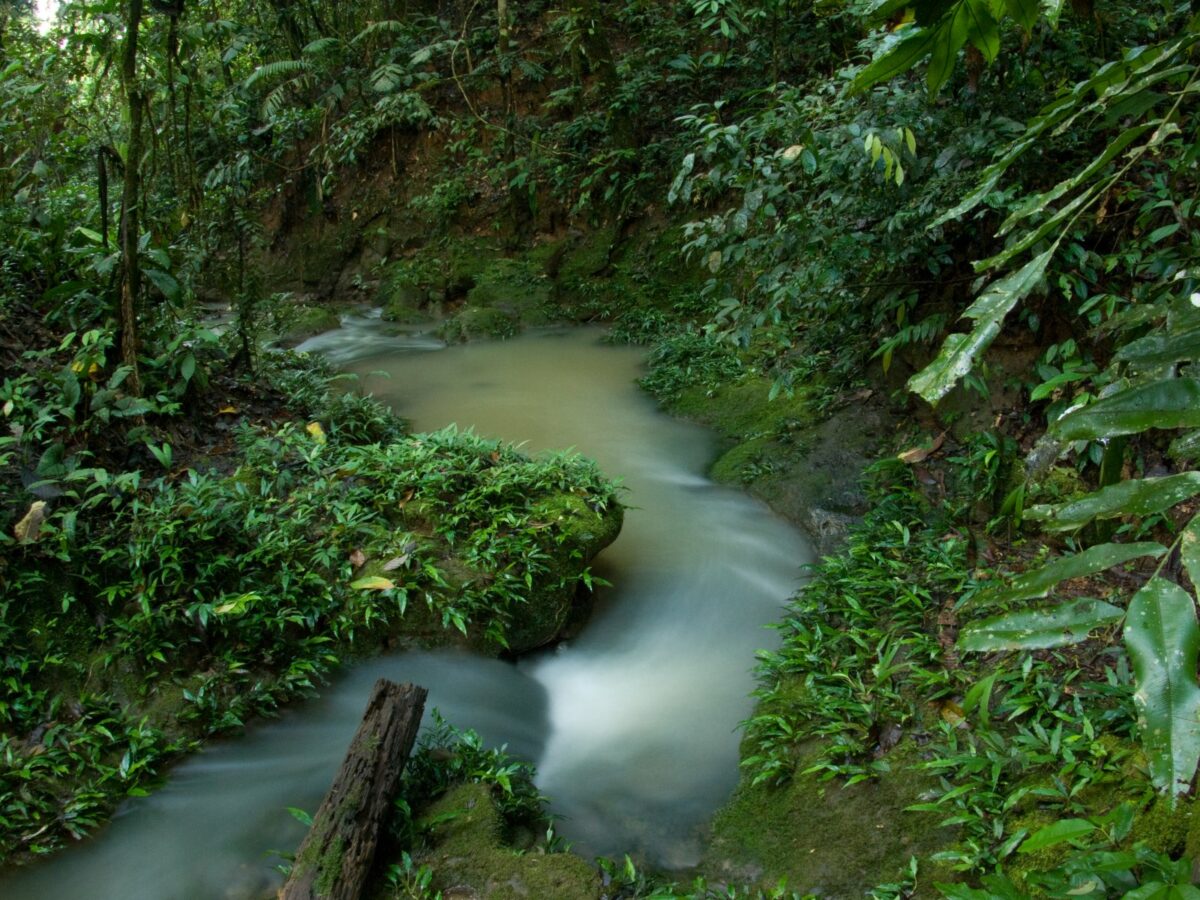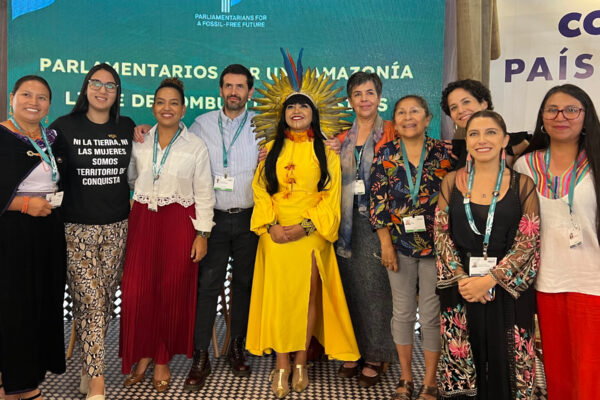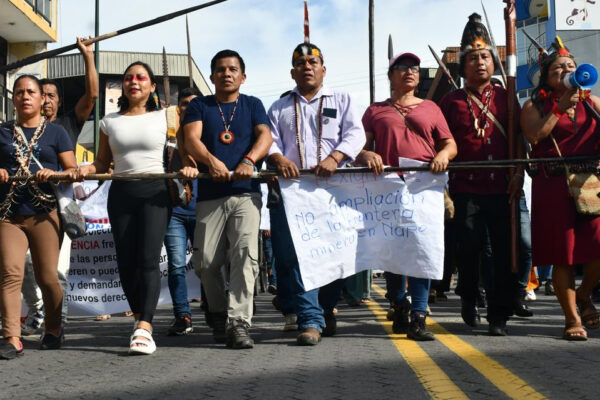In a historic vote on August 20, 2023, Ecuadorians have shown the world what true climate leadership looks like. In the face of rising violence, fear, economic uncertainty, and political upheaval, the country chose hope. Their vote is a step toward a fossil fuel-free future that protects biodiversity and the rights of isolated Indigenous peoples, opting to halt its largest oil project and keep close to 1.5 billion barrels of crude permanently in the ground.
The vote to protect Yasuní National Park has global implications. Although the Ishpingo, Tiputini, and Tambococha (ITT) oil fields lie beneath Yasuní, it is so much more than a resource. It is a UNESCO World Biosphere Reserve and widely considered one of the most biodiverse places on the planet. Its unique position along the equator also allows it an outstanding level of biodiversity, containing more than 120 reptile, 596 bird, 200 mammal, and nearly 500 fish species. One single hectare of Yasuní forest contains at least 100,000 insect species.
The ballot initiative asked voters if they were in favor of keeping the fields permanently in the ground, which prevailed by an almost 20% margin. The national referendum was held as part of snap elections after current President Guillermo Lasso dissolved congress in June. Two candidates, Luisa Gonzalez, hand-picked candidate of former President Rafael Correa, and right-wing businessman Daniel Noboa will face each other in an October run-off. The vote was held amid rising violence and insecurity in the country. A high-profile assassination of anti-corruption candidate Fernando Villavicenio on the streets of the capital city of Quito in broad daylight sent shockwaves through the country, which has traditionally been free of narco-violence but has seen spiraling crime and shocking murders in recent months.
A global first
Never before has a country, by national referendum, voted to keep fossil fuels in the ground, let alone a former member of the mighty Organization of the Petroleum Exporting Countries (OPEC) and a net oil exporter where oil exports account for an estimated 10% of the country’s GDP.
There are an estimated 1.67 billion barrels of crude in the ITT fields, where 225 active wells currently produce 57,000 bpd, accounting for about 12 percent of the roughly 480,000 barrels of oil produced daily in Ecuador. The fields represent 20% of the country’s total reserves, with initial wells only beginning production in 2016. More than 500 total wells were planned.
But for over 50 years, Ecuador’s efforts to drill its way to prosperity one well at a time have failed and mired the country in debt and dependency. It has left communities on the front lines with toxic waste pits and contaminated water and felled forests, and it has provided a gateway for destructive agribusiness, and industrial and illegal mining. Ecuador’s two major oil-producing provinces – Sucumbios and Orellena – continue to be the poorest in the country after decades of promises of oil-led development.
Ecuador’s vote not only stops expansion – the construction of dozens of new platforms and hundreds of planned new wells. It puts an end to current production, requiring Petroecuador to remove rigs and close wells, dismantle more than 80 km of pipeline, and remediate, reforest, and restore the area to its state before any oil activities began.
In the face of the climate crisis and the urgent need for a rapid transition from fossil fuels, some countries like Costa Rica and subnational jurisdictions like Washington state have agreed to forgo extraction of reserves or made commitments to restrict new extraction, as part of the Beyond Oil and Gas Alliance (BOGA). But many of these reserves are unproven, smaller in size, or not economically viable.
The other victor here is participatory democracy. The decision to keep oil in the ground did not come via policy, legislation, or presidential decree. It came from voters, in a process enshrined in the country’s constitution, making it irrevocable. Though of course the oil industry and government agencies are gearing up to challenge and delay at every turn of implementation.
The government and industry public relations machine
In the run-up to the vote, industry and the government waged a campaign designed to stoke fear in voters that the economy of the country would collapse by shutting in production and restricting expansion. Energy Minister Fernando Santos called it “economic suicide” that would bankrupt the country, citing discredited data that the country would lose an estimated $1.2 billion in revenue, with the price tag of closing wells and dismantling oil operations in the hundreds of millions. He also floated the idea of not respecting the vote at all, but had to backtrack after a firestorm of criticism and clarification from the Lasso administration.
But there are economic repercussions for Ecuador, which still owes China 160 million barrels of oil by 2024 to pay off oil-for-cash loans. Diminishing production means fewer barrels of oil available to sell on the open market. Outgoing President Lasso has threatened to make up any budget shortfall by removing gas subsidies, which has been the trigger for major protests by the Indigenous movement that depend on reduced prices for diesel and cooking gas. But according to Yasunidos, who led the campaign for a “Yes” vote, a 1.5% tax increase on the country’s largest businesses would generate an estimated $2 billion – more than enough to cover revenue from lost production.
Petroecuador is already putting up obstacles to implementing the will of voters, arguing that it isn’t technically possible to remove all traces of oil activity in a year. Although this may be true, it has the obligation to take steps in good faith to wind-down production. The Constitutional Court, which interpreted the scope and timeframe of how to implement the ballot measure if successful, ruled for an “orderly and progressive withdrawal of all activities related to oil extraction within one year.” The court is not composed of petroleum and environmental engineers, and proper well closure and removal may indeed take more time. But it can’t take decades. Petroecuador and the oil industry have a history of ignoring rulings of district courts, such as a September 2021 order to eliminate gas flaring linked to rising cancer rates within 18 months, only to see the number of flares increase from 447 to 475.
But Petroecuador’s lack of capital and transparency, endemic corruption, and environmental track record – it averages two spills per week – means independent monitoring of implementation will be essential to making sure a solution for Yasuní doesn’t become a bigger problem.
End of extraction?
While the landmark vote stops drilling of the ITT fields in what is known as the Block 43 oil concession, there are at least eight other oil blocks that overlap Yasuní National Park, where oil activities will continue, posing an ongoing existential threat for the nomadic Tagaeri-Taromenane and Dugakaeri isolated peoples.
Keeping the oil within Block 43 permanently in the ground will push state-run Petroecuador to increase existing production elsewhere if it can, or open new wells to make up for lost production. The company is likely to turn to areas close to existing infrastructure with shuttered wells, which could increase conflict. In February of this year, Cofan leader Eduardo Mendua was murdered in the community of Dureno over his opposition to oil plans by Petroecuador.
The vote could also spur renewed interest to open up millions of hectares of Ecuador’s largely roadless rainforest in the country’s southeast Amazon by the incoming government. Various attempts to auction the Ronda Suroriente of over a dozen oil blocks overlapping titled territories of seven nationalities have failed due to local resistance and international campaigning. But if the country doubles down on extraction instead of working towards managing the production decline and supporting a just transition to a post-petroleum economy, these areas could be on the auction block once again.
National voter rights vs. local FPIC?
With government and industry reeling from the “Yes” vote, both have begun to point to Sucumbios and Orellana, the two oil-producing provinces where “No” carried the day. Suddenly they have become champions of the rights of local communities to approve a drilling project, even highlighting their right, with zero irony, to “resist” a mandate from the national vote.
However, this is a false dichotomy. The government never properly consulted adjacent local communities about the project, and cannot benefit ex post facto from its own error. While they may have signed an agreement for social compensation, it fails to meet any due process of Free, Prior, and Informed Consent (FPIC). The right to FPIC is also designed to address external intervention that is imposed, and it does not guarantee a right to a project. And it raises the question about what the communities are also wanting: is it an oil project, or necessary basic services that are obligations of the government but have been withheld or never provided?
Additionally, the rights of isolated Indigenous peoples must be taken into account. The fact that they are in voluntary isolation indicates their rejection of extraction projects, and they have special rights and protections guaranteed in the Constitution which can not be infringed upon or subjected to the will of voters.
Time to End Amazon Crude
In Ecuador, people took the climate crisis, defense of Indigenous rights, and protection of the Amazon into their own hands. In the face of industry and government impunity, they took leaders to task at the ballot box and forced them to do what is necessary but were unwilling to do. And if Ecuador can do it, so can and should countries in the global north like Norway or the U.S., which are overwhelmingly responsible for the climate crisis and possess far greater economic and energy alternatives.
The message from Ecuador to California – the number one consumer of crude from the Amazon – is loud and clear. The climate, biodiversity, and Indigenous rights are more important than a few weeks of oil. Governor Newsom should heed the call of millions of Ecuadorians, and people like you in solidarity with this movement, and eliminate dependency on Amazon crude now! The Ecuador vote also sends a message that banks should beware. Continuing to fund oil extraction in the Amazon will only lead to increased project risk and stranded assets.
The world needs to join Ecuador towards a rapid, equitable transition and complete phase-out of fossil fuels!














